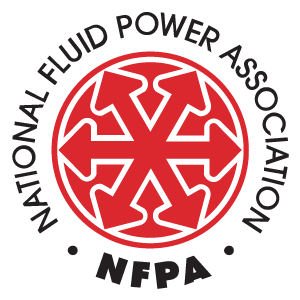NFPA is looking for Engineers to lend their expertise to writing the very standards you use every day!
NFPA manages the ISO Technical Committee 131 (Fluid Power Systems) which covers Hydraulic AND Pneumatic Components.
The US TAG (Technical Advisory Group) is the mirror organization that reaches consensus on the US position for these ISO Standards.
Most TAG meetings are done virtually, so it has never be an easier time to become involved!
Fill out the form below and Allison Hade will reach out to you about joining the US Technical Advisory Group (TAG) to TC 131.
Standards for fluid power products and systems fall into three basic categories:
- Communication standards define the basic terms, symbols and other communication tools used in the fluid power industry. Vocabularies, graphic symbols, and dimension codes are typical subjects for communication standards.
- Design standards establish dimensions, tolerances, or other physical characteristics of products. They ensure that fluid power products meet dimensional criteria that enable interfacing and interchangeability.
- Performance standards provide a voluntary method of rating products. Pressure rating, particle counting methods used in contamination analysis, and methods of testing for strength and volume are typical performance standards.
Why do standards matter in fluid power?
ISO standards, technical specifications, and technical reports play a key role in fluid power technology. Designing, assembling, and maintaining a hydraulic or pneumatic system often involves putting together a variety of components, often from a variety of suppliers. Without standards for dimensional interchangeability, performance measurement and communication, safety requirements, and testing and inspection methods, these processes would be much more difficult.
Why get involved in standards development?
Getting involved in this process can bring significant advantages to participating individuals and businesses alike. Advantages include:
- having early access to information that could shape the market in the future;
- giving your company a voice in the development of standards;
- helping to keep market access open.
Getting involved in standards development brings your concerns and needs to bear on the process that can effect you and your customers in the future.
If you would like to join one of the subcommittees and/or to learn more about the development of fluid power ISO standards, contact Allison Hade at ahade@nfpa.com.
Like this post? Share it!
Recent Posts
Update to Regional Demand Estimates Report Now Available
The U.S. Fluid Power Regional Demand Estimates Report has been updated with 2023 estimates and is now available for download. This Excel-based report is prepared for NFPA by Oxford Economics and profiles the geographic distribution of fluid power products to end-use industries by state, including fluid power sales dollars, fluid power sales percentage, and number of…
Hear from an NCAT Student Engaged in NFPA Workforce Programs
We’re excited to share a new testimonial video from David Castro Lastor, a junior mechanical engineering student at North Carolina Agricultural and Technical State University and president of the university’s Fluid Power Club. In his video, David shares how participating in NFPA programs has shaped his academic and personal growth. Through his leadership in the…
New Episode of Fluid Power Forum: Advanced Modeling Techniques and Performance Comparisons of Electrohydraulic Systems
Today, our guest is Bruno Dupuis. Bruno is a Corporate Accounts Manager at Famic Technologies Inc., the company behind the development of Automation Studio™, a circuit design and simulation software for fluid power, electrical, robotics, process control and automation projects. He presented at NFPA’s Hydraulics Conference co-located at the 2024 iVT EXPO back in August.…



